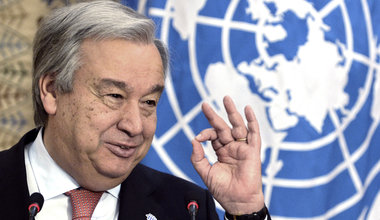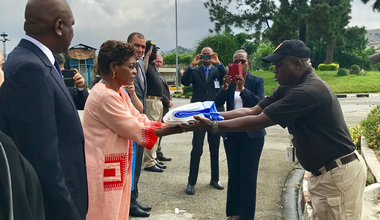UNOCI organises intercommunity dialogue sessions in Bayota/Logouata and Ouragahio : the people commit to social cohesion and development

The people of Bayota/Logouata and Ouragahio have made a commitment to consolidate social cohesion and work for the development of their localities. They made the commitment in the presence of the Special Representative of the United Nations Secretary-General for Côte d'Ivoire, Aïchatou Mindaoudou, and several UN agencies representatives, including the UN Development Programme (UNDP), UN Women, the UN Food and Agriculture Organisation (FAO) and the UN Population Fund (UNFPA). The occasion was the presentation of recommendations made during two intercommunity dialogue sessions organised on 22 and 23 September 2015 by the United Nations Operation in Côte d'Ivoire (UNOCI), in these localities situated at more than 300 kilometres from Abidjan, in the Gôh Region, centrewest of Côte d'Ivoire.
«As a representative of this population, I'm making a firm commitment that we are going to live in harmony here in Bayota », said the Chief of Nékédji canton in the sous-préfecture of Bayota, Boti Koudou. « We have suggested to the deputy prefect that we set up a tripartite commission comprising members of the indigenous and immigrant communities, as well as local government, that will be in charge of raising the alarm with the deputy prefect at the first sign of any trouble. This would mean that from chief to chief, official to official we can put out the fire, » he added.
«After discussions with our sisters and after we had made our apologies, we made a commitment that we would do our best to ensure that in Bayota, we would live in perfect harmony from now on and work for the development of our town, », said the spokesperson for women to the UN delegation.
In Ouragahio, the women recommended establishing « a sensitisation platform regrouping all the women presidents of the different communities » to peacefully resolve any conflict.
The youths followed in their footsteps by recommending « strengthening communication between community leaders and intensifying messages of peace through local radio stations ». They also stressed the need for a more efficient system to resolve rural land disputes.
« The right response must come from you ».
The Special Representative, Aïchatou Mindaoudou, welcomed the sense of responsibility shown by local people which had brought about calm. She urged them to perservere along this path. « You have shown that you know the right way of doing things. You have made a commitment to do all you can to make sure that what happened does not happen again. It is up to you, » , said Mrs Mindaoudou, addressing the dignitaries of the region who attended the meeting. « We will be here to accompany you, » she added. The head of UNOCI also seized the occasion to announce the launch of several projects aimed at supporting efforts to promote social cohesion.
The Prefect of Gôh Region and Prefect of Gagnoa Department, Rémi N'Zi Kanga, addressed people with these words: « I'm asking you all to make sure you learn the techniques to prevent and manage land disputes which you were taught during these two days of intercommunity dialogue. The first technique that we have to start with is self-restrain. We must be capable of asking ourselves if what we intend to do will contribute to strengthening social cohesion». The Prefect of the region concluded by thanking the Special Representative and the UN delegation for all their support to the region.
The two intercommunity dialogue sessions were organised following violent incidents in the region on 10 September 2015 which led to loss of life and the destruction of property. The aim of the meetings was to provide an opportunity for traditional and religious authorities, young people and women in Bayota/Logouata and Ouragahio to meet and discuss what role they can play in ensuring a peaceful electoral environment and a definitive and lasting crisis resolution. More than 350 people from different sections of society took part in workshops and made a commitment to use peaceful to resolve their differences.
The recommendations made by the different groups included: general training on the culture of democracy, fighting against impunity and security support, management of land issues, humanitarian support by rehabiliting community infrastructure, repairing burnt houses and support with income-generating activities.
 UN
UN United Nations Peacekeeping
United Nations Peacekeeping







